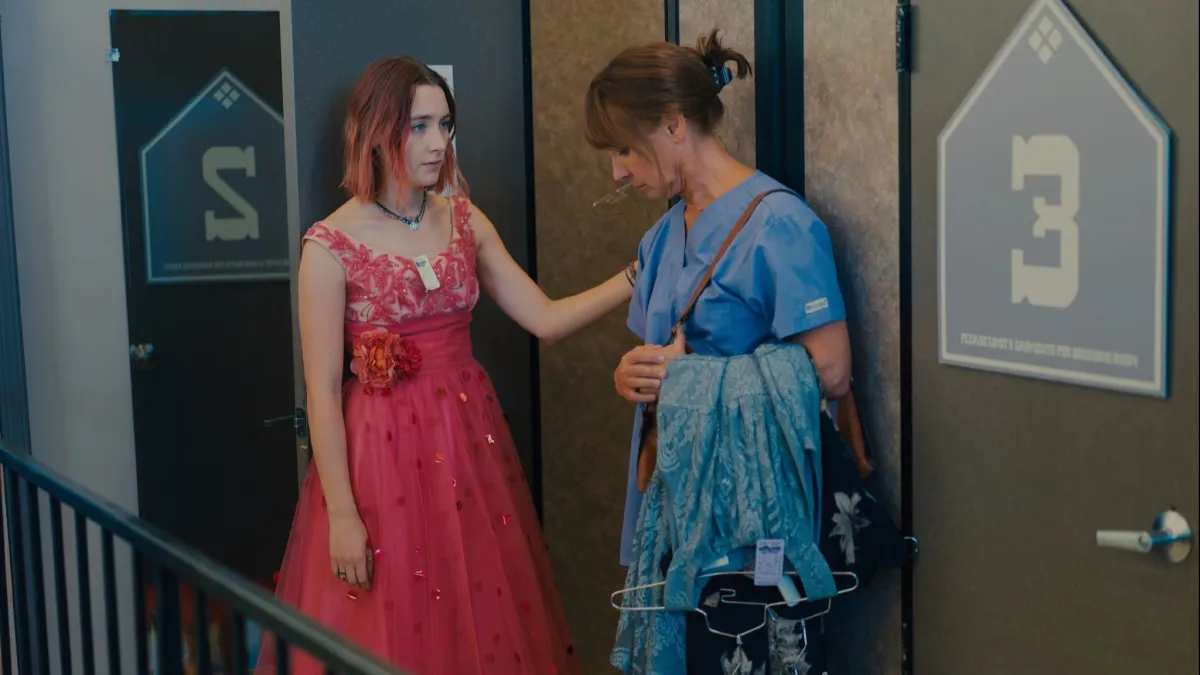It’s difficult to admit that I personally identified with the erratic flux of mother-daughter emotions in Greta Gerwig’s Lady Bird. One moment, mother and daughter are confidantes that dance around their emotions, but the next, their amiability swerves into a squabble. Then they’re squealing mutually over a thrift store dress.
Living in unremarkable Sacramento on “the wrong side of the tracks” (literally too), as post-9/11 scenes flash on her television, Lady Bird McPherson (Saoirse Ronan) is surviving in the minuscule universe of her ego. Lady Bird’s given name is Christine, but she wields her stage name to grant an edge and distinction to her humdrum life in Catholic school. She complains about the drudgery of her low-income life, while her mother, Marion (Laurie Metcalf), complains the costliness of her lavish dreams. We can’t blame Lady Bird’s insatiable desires. Neither can we judge her mother for doubting she can invest in Lady Bird’s college goals (even if financial aid is brought up). Marion herself is an indefatigable breadwinner with a soft-spoken, job-hunting husband (Tracy Letts), who’s a more favorable nurturer to Lady Bird.
At first, Lady Bird unintentionally borders on self-parody in its bildungsroman tropes, with extremely on-the-nose dialogue (“you’re not worth the tuition”). But the movie succeeds in balancing its modest execution with Lady Bird’s pursuit of grandeur. We acclimate to the heroine’s affected mannerisms and her chronic need to impress others with feeble glibness, which meets questions and confused glances from peers. Gerwig grounds the film in humility, occasionally teasing explosive dramatic turns, only to pass them by. When Lady Bird dispenses an attempt at hyperbolic humor (“I’ll kill your parents”) it backfires when her crush mentions that his father has cancer.
Unfortunately, Lady Bird’s idealized desires are not reachable in practice. Wanting more out of life is financially, and emotionally, expensive. When she discovers her father’s depression medicine in the bathroom, she does the calculation and draws the conclusion that she’s a burden. In one of the most potent scenes, Lady Bird demands her mother write on paper just how much dollars she cost, dreaming aloud that one day she’ll make more than what she costs.
The brilliance of Lady Bird is that, for a girl willing the world to revolve around her, she’s an orbiting satellite in others’ stories. The supporting characters leave their mark, to suggest that another emotional universe operates outside of Lady Bird’s head, even if we parse their struggles before Lady Bird ever does. Lady Bird’s friend Julie (Beanie Feldstein) eyes her math teacher and goes through a breakdown upon seeing her teacher’s pregnant wife. Lady Bird also falls into an immediate infatuation with Danny O’Neil (Lucas Hedges) over his Stephen Sondheim “Giants in the Sky” audition song, though a twist spurs their breakup and subsequent friendship.
She gains a second boyfriend (Timothée Chalamet), a bad boy maverick with a conspiracy about cell phones being used as government tracking devices. Later, she casts off Julie to win the admiration of a richer classmate, Jenna Walton (Odeya Rush) who would typically embody the snooty “rich bitch” trope. Lady Bird misleads Jenna into believing she lives in a wealthy neighborhood. Despite being a budding rebel herself, the queen bee is more offended by Lady Bird’s dishonesty of identity than her lack of class status.
Gerwig gives even the less savory supporting characters humane lens, showing that Lady Bird is not aligned with them, not because they are a bad crowd, but because they’re disenfranchised souls in search of something different from the heroine’s goals. Lady Bird just seems to be a passing supporting character in their own coming-of-age arcs.
It turns out that Lady Bird is the mother’s coming-of-age too, and no maternal dynamic could be more refreshing in cinema. In a powerhouse, award-worthy moment by Metclaf, she drives in a loop back to the airport where she deposited her college-bound daughter. Gerwig’s approach teases an in-person reconciliation with Lady Bird, but she only arrives in time to sob in her husband’s arms as her daughter takes flight. Her tears are of joy, realizing she was able to release her daughter out of the banal loop of Sacramento. Letting her Lady Bird leave the nest was her arc. For mother and daughter, their resolutions are not upfront, but the revelations sneak up on them.
Although Greta Gerwig is known as an actress, her directorial debut illuminates a candid promise for her future projects. I caught the screening at the New York Film Festival. As Gerwig was exiting the Walter Reed theater, I told her, “I’m about to see my mother [who is visiting from Houston].” She smiled. She gets it.
Carol is a queer Vietnamese-Houstonian Earthling surviving under the fickle weather of New York while buried in her Non-Fiction MFA homework like Hermione Granger and her Hogwarts studies. When not angsting over her first poetry manuscript or a pilot screenplay about space samurais, Carol is cooking her own Chinese food instead of buying take-outs and dreaming of winning Hamilton lotto tickets.
She chronicles the quirks of New York living, runs writing and scripting services, and lends her voice to Birth Movies Death, Film School Rejects, and The Script Lab. She’s also lurking in the shadows waiting for you to follow her on Twitter or Tumblr and read her Star Wars fanfiction.
Want more stories like this? Become a subscriber and support the site!
—The Mary Sue has a strict comment policy that forbids, but is not limited to, personal insults toward anyone, hate speech, and trolling.—









Published: Nov 2, 2017 12:43 pm